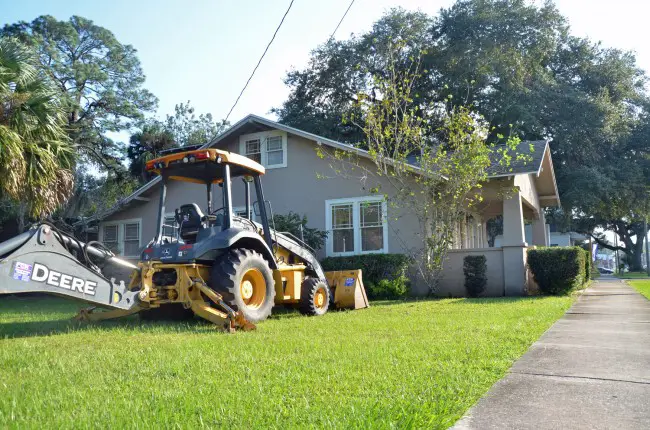
It’s a stately old house right next to the Flagler Playhouse—what used to be a Baptist church—along Moody Boulevard in the heart of Bunnell. It’s been renovated by its current owner, Clifton Sheffield, who bought the house for $700,000 from the First Baptist Church in 2007, according to property records. And it’s been cherished through its eight decades by people who lived in it, and now by those who see the house as a connection to Bunnell’s history, which often intersects with their own.
But the house’s history and the property at 401 East Moody Boulevard are suddenly at the center of a clash between a city commission and residents looking to preserve—if not define—the city’s character along its main east-west road on one hand, and the property rights of its residents on the other. That battle may be determined by how the issues surrounding the house and the property are resolved.
According to his lawyer, Sheffield has a contract to sell the property to a developer who builds Family Dollar stores. That developer has already approached Bunnell’s administration to get a sense of what it would take to build a 10,600 square foot store there. When Mick Cuthbertson, Bunnell’s community development director, presented the idea to the city commission for discussion Monday evening, the reaction was swift and nearly unanimous: four city commissioners spoke against having a Family Dollar store there, and a dozen people who addressed the commission urged the city to find a way at least to save the house, if not to prevent a store from being built there.
From Surprise to Demolition Order
Sheffield was reportedly stunned by the reaction. He secured a demolition order for the house this week, though Robert Cuff, his lawyer, said Sheffield was willing to give the city time to come up with a compromise. The house, Cuff said, has no less meaning to Sheffield than it does to those looking to preserve it.
“He has as much history there as many of the folks that want to save the house,” Cuff said. “My understanding is that he was born in the little brick house behind the church that’s now the playhouse. He’s not insensitive” to the preservationist’s wishes. But, Cuff said, “he’s already signed a contract to sell the property.”
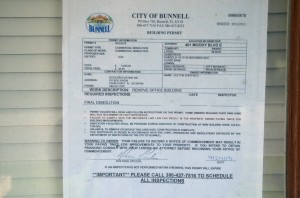
Thursday morning Sheffield was told that a group would like to try to buy the house and the property, in lieu of relocating the house,” Cuff said, “But that’s something I gather he just heard about either very late last night or this morning before he spoke to me.” And since a contract has already been signed to sell the property, aborting that contract may no longer be possible. The demolition permit, meanwhile, is in effect, and the house may be torn down legally any time Sheffield chooses to do so.
“We issued the permit because that’s what we do, and he submitted the appropriate stuff they need to get the permit,” Cuthbertson said Wednesday. “We asked him before he demolished the house if he’d consider some kind of donation to the city of that house, then we would relocate it, because the house was built in either 1926 or 1930, I’m not sure, so there’s some historical significance to my elected officials. So I’m in negotiations with the fellow right now to see if we can relocate that building rather than see it demolished.”
All week city officials, members of the Flagler County Historical Society, residents and business owners have been scrambling to come up with just such a compromise—at least to save the house. By midweek, there was talk of John’s Towing and Cline Construction possibly volunteering their services to have the house moved to a temporary location behind Bunnell’s old coquina city hall, and then, if the county were to approve, to move it next to the Historical Society’s Holden House, across from the old courthouse, and very near the house’s original lot.
“He’s willing to work with us,” Cuthbertson said late Thursday afternoon.
“From what he’s told me, he’s certainly not in any big rush to tear the house down,” Cuff said. (Sheffield briefly spoke with a reporter Wednesday and said he would be willing to meet later in the day. He did not contact the reporter again, however, and an attempt to reach him Thursday was fruitless.)
But that’s only half the story. The other issue is the future of the property itself.
Another Dollar Store in the Works
Cuthbertson wanted to bring the matter before the city commission Monday to get a sense, “preferably by vote,” whether the commercial project considered for the property was in the best interest of the city. Bunnell restricts the size of a commercial building to 5,000 square feet and the amount of paving on a property to 50 percent, unless exceptions are granted. In this case, the developer told Cuthbertson that the building planned for the property would be 10,600 square feet, with 64 percent of the property to be paved. The Family Dollar store that just opened two blocks away is 8,300 square feet.
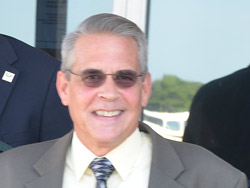
There is also at least one, possibly three, trees on the property that may be so-called “specimen trees,” which enables the commission to order that the trees not be removed. The city administration has determined that at least one of the trees fits the definition of a specimen tree, though the developer told Cuthbertson that the tree can be incorporated into the new building’s plans, and saved. Not so regarding the old house. Regardless, the city has no ordinance in place that keeps a property owner from demolishing a house.
“I asked the developers and they granted me the courtesy of bringing this for the commissioners and having the commissioners determine whether they think this project is in the best interest of the city,” Cuthbertson said Monday evening. “I’m fairly confident that if we report back to them that the commission is concerned about the appropriateness of this project, I’m pretty sure that they’ll go in a different direction.”
City Commissioners Recoil
Much of the city’s attitude toward the potential new Dollar Store is affected by its experience with the Family Dollar that just opened, the second store of that type within the city.
On the previous project, “I was all on the tail-end of that dog and did not know that the project came until it had been passed completed and was breaking ground,” Mayor Catherine Robinson said. “So on this one we’re a little bit more pro-active. I’m glad that it’s come before the board.” She said she was “taken aback” that the property was on the market to be sold “for the reason” talked about. “Even though it’s not officially designated as a historical district, it is our historical district, and to put a store right there beside where the First Baptist Church is, was, the Flagler Playhouse, really, there’s no transition, it just becomes commercial. I have a concern about that. I have a concern about the whole concept. That’s my thinking about it.”
The area, however, is zoned commercial, and a property owner—absent special exceptions or variances—can build or open a commercial business there without interference from the city, just as a property owner may sell a lot to a potential commercial developer without interference. Still, three commissioners immediately agreed with Robinson, creating a majority of four already opposed to a project that has yet to go before the city’s planning and zoning board, or, indeed, before the commission itself.
“I agree with everything you said,” Commissioner Bill Baxley told Robinson. “We’ve got two stores already of this type. We don’t want to turn the town into Dollar Generals.”
“I go with everything you all just said,” Commissioner John Rogers said.
“The same, I agree with everything you said,” Commissioner Jenny Crain-Brady said. “I, too, know the owner and know the loving care that went into this and how proud they were of this property when it was purchased. I understand the economy and needing to sell property. I have properties myself that have been on the market for many years. I wish Dollar General would come and see me because I’m not on this road.” There was laughter in the room. “But this is not an appropriate spot for that type, and it seems to me when you have this many variances that would need to be granted, that alone is the answer.”
Twelve Voices for Preservation
The floor was then opened for public comment. Twelve people spoke, all of them opposed to the commercial development or the demolition of the house.
Thea Mathen, a member of the city’s planning and zoning board and of the Community Redevelopment Board, spoke of the long efforts spent on trying to create an overlay historical district that’s now being lost, “house by house.” The specimen tree on the corner, she estimated, is 130 years old. Stephen Jones, a member of the county’s housing authority, said the authority wasn’t happy when the Family Dollar store was built on Moody Boulevard, and would have rather seen it on U.S. 1. “Let’s move on and look at other areas,” he said. James Fisk, a director of the Flagler County Historical Society, said the house in question is potentially eligible to be on historical registries. Mary Ann Clark, the president of the society, noting that the city has been supporting history and its preservations, reminded commissioners that the house at 401 East Moody is barely a few years younger than the old courthouse, built in 1927.
Audio: The City Commission’s Full Sept. 23 Discussion On the Property (36mn)[media id=349 width=350 height=250]
Layla Henry Pontius said she grew up in Bunnell as her parents and grandparents did. “And that was my grandmother’s home,” she said. “It hasn’t changed that much.” She said she likes what remains of the old homes, which are being lost. “Where that house is, and I’m not against development, I am not ever against development, but there I don’t think it’s the proper place to put it,” she said. “Have it be used for something else. But don’t tear the house down just to build a concrete one that in 10, 12 years probably is going to be vacant or have trash or whatever, it’s going to change hands. I just can’t see tearing the house down, trying to preserve trees, if you put concrete there and all on them, it’s going to die, they’re not going to stay.” Bunnell, she said, must be preserved as the “old, welcome town.”
The lot at 401 East Moody is not exactly in the middle of rustic old Bunnell, though. It’s flanked by the Playhouse to the west, with a Bank of America and the more discreet building of the Flagler Abstract Company across the street. There’s a beautiful house immediately across from 401, but then just east of that spread an insurance office, the Mobil-Kangaroo station and its garish greens, a Chicken Pantry restaurant and, of course, on the odd side, the Family Dollar. What old houses remain on that stretch of State Road 100 are clustered further east.
Jan Reeger, the Bunnell Realtor, said she sat on her front porch and watched the Family Dollar being built “with some trepidation.” The architecture troubled her, so is the lack of questions being asked of developers “to dig in their pile of blueprints and come to us in a way to preserve the tradition, the culture, the heritage, the things that we want to accomplish for Bunnell.” Architectural standards, she said, must be drafted for the city. Mark Langello, also a member of the planning board—who spoke as a local business owner, not a planning board member—stressed the notion of standards that fit with the city’s intentions, with commerce in some areas, such as U.S. 1, and preservation in others.
Gloria McArn Deen, who lived in the house for 20 years, spoke of the city’s charms—and some of its lesser charms in some areas. “Do we want the rest of Bunnell to look like that? I understand the economic constraints. That’s really important. And I understand that we have an emotional tie to this building, and I know that emotions don’t pay bills. But I do appreciate what you all are trying to do.” She was followed by the daughter of the man who once owned the house, who spoke of the younger generation—her generation—also wanting preservation to be part of Bunnell’s identity.
Several others spoke along the same lines.
Tucker’s Dissent
Sheffield was not in the audience, and, his attorney said, had not been aware that the matter would be discussed Monday evening.
“My take on that as an attorney working with Cliff and probably appearing before planning and the city commission,” Cuff said, “it sounds like we’re getting the cart before the horse. I understand the concern, staff discussing something with the city commission. But as far as I know there was nothing on the agenda scheduled to consider any variances.”
It was left up to Commissioner Elbert Tucker to raise the only dissenting voice of the evening, and the only voice explicitly reflecting the interests of the property owner—or his rights.
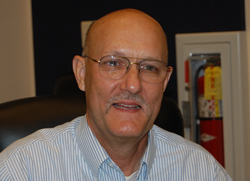
“Just to bring up the point that we’re all talking about somebody else’s property,” Tucker said. “What kind of benefit are we going to be able to give to the property owner for preserving this?” He considered the ideas presented in the previous half hour, such as the preservation of the house. “Are we going to give him a tax break? Is Flagler County going to give him a tax break? Is there anything that the property owner is going to benefit by not selling this piece of property and to do something to these trees? There has to be something that will benefit the property owner other than him being a philanthropist, because his business is not as good as it was six years ago or seven years ago. So he’s put money into it, how is he going to get his money back, how is he going to be treated by the government, in order to be this benevolent person that’s going to give this property, in essence, to everybody else at his expense? What can Bunnell do? Perhaps that’s a question for Mr. Branch.”
Raymond Branch was the commission’s attorney that evening. Branch did not consider the question of historical preservation, but rather the matter of what may be done with the property by a commercial developer. “It’s entirely discretionary with the city commission whether to approve a special use or a special exception,” Branch said.
Absent those special exceptions, it would be a different story. The property owner would be within his rights to do with the property as he pleases. But, Branch added, “there is no legal requirement that the city has to offer any kind of legal incentives to the owner of the property if the special exception were to be denied.” (There are no specimen trees on the Family Dollar property down the road, and the development did not exceed the permissible paving proportions. The developers did request—and receive—an exception for the size of the building, however.)
A Taste of What’s to Come
Tucker focused on the matter of the house’s preservation: “Unless we have a mechanism to help the owner recoup some of his money,” he said, “I think we’ve got a real problem, because I don’t think Cliff—he may be benevolent, but I don’t think he’s that benevolent.”
Cuthbertson did not get the vote he was seeking to take to the potential developer of the property, but he clearly got a picture of what the developer might expect down the line.
“You’ve gotten a taste of the concerns that the board has and the taste of the concerns of the public and the historical society,” Robinson said.
Meanwhile, the demolition permit is ready to be executed—and the next meeting of the planning and zoning commission is in the third week of October. That order led Thea Mathen to characterize Sheffield as “holding the house hostage” to his wishes.
Cuff said the characterization was off the mark. “I certainly don’t get the impression from talking to Cliff that he’s trying to use the house in any way to get something he wouldn’t be entitled to anyway from the city,” Cuff said. “I think he just wants to try to work with everybody and if they want to preserve the house he’s happy to work with them. In the meantime he has a contract and he’ll be working with the buyer, and we certainly hope the various levels of government will respect his rights to the property.”
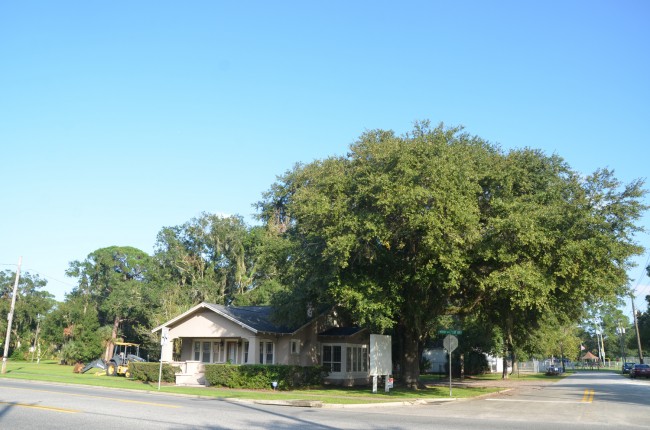





























Genie says
There goes the neighborhood….The developer always wins.
Charles Gardner says
The property can be developed with a 5000 square foot building, zoning permits it. To deny development that conforms to zoning would be a taking by zoning and the owner would have to be compensated. The county could buy it and use it as a sheriff’s outpost.
tulip says
Mr. Sheffield paid 700,000 for that house? Why would he be willing to pay that much plus renovation costs for that place. That piece of land must be worth a lot , house or not.
Charles Gardner says
This site takes up about 80% of that block.
confused says
Well I can tell ya right now, nobody I know wants to see another dollar store or a family dollar. Trust me, and that’s not what this town needs either
Mike Tee says
Family Dollar????????? Please!!!!!!!!!!!!!!!!!!
satan.d.worldonfire says
So you put in another everythings more than a dollor store in 1 block from the new one mile from the other. L ets take bets on wich one goes out of buisness first. Now we just hav e an other un occupied building.
Rev. Beth Gardner says
Family dollar is just a block away… Is the contract really with them or someone else? I agree with so many others – we do not need another dollar-type store in Bunnell. Why all of a sudden is there a rush with regard to this piece of property? It has been for sale for years!
palmcoastpioneers says
State of Florida ‘ Main Street Program ‘
Would any elements of this be part of ‘Floridas’ Main Street Program’?
http://www.flheritage.com/preservation/mainstreet/
rhweir says
A Dollar Store in an area that probably has the only architecture worth preserving in an otherwise barren and poverty stricken area. Trashy is as trashy does. I’d like to see the Dollar Stores go the way of the internet cafes. I guess this makes the tire stores, fish market and biker bars the only redeeming structures in Bunnell.
bunnell property owner says
If the city actually followed its policies of the comprehensive plan, there might actually be policies in place to protect historic resources. See policy 3.1.1 of the future land use element which states “the city shall adopt a historic preservation ordinance…”. Its pretty simple. No historic preservation ordince; no protection for historic resources.
Crusty Old Salt says
There are a couple of issues both for and against the property owner and the City of Bunnell.
1. The developer will need a special exception to build a Family Dollar store there based on lot coverage. (paving and square ft.) Bunnell has no legal right to grant either one.
2. The property owner has a legal right to demolish the old home, regardless of the historic value and has a permit to do so.
3. The property is zoned commercial which allows a commercial business under a legally principal permitted use. If Bunnell did not want this type of business in the commercially zoned corridor, then that should of been addressed years ago.
It would appear, one solution would be to allow the commercial storefront with the special exception if the property owner agrees, at his own expense, to relocate the home to another appropriate location. This will preserve this historic home. Regarding the tree that qualifies as a specimen tree, that would also have to be saved.
Not the ideal situation, but a equitable compromise under the circumstances. It would appear this is going to be a give and take on both the property owner’s and the City of Bunnell’s part.
confidential says
Thank you so much PalmCoastPioneer!! Great link.
This house is a gorgeously preserved piece of Bunnell History. Why to approve another Dollar Store that would be an eyesore there, a box store in place of these historical jewel? Where is common sense? C’mon where are our “Local Good Old Boys” Cowboys, Florida Crackers with all due respect” fighting for some preservation..? Where is Hutch King? Lets make Moody Blvd. aka Rt. 100 in Bunnell our historical main street by preventing the demolition of all those historical homes and also preserve our historical former Court House.
Does Bunnell have a historical committee/ society to address this issue ASAP? Look at that majestic maybe centenary Oak in the corner! Please do not let them do in Bunnell what was done in Palm Coast with our beloved Sheraton/Palm Coast Resort. Put a moratoria in any commercial development in those few historical blocks of Moody Blvd. NOW.
palmcoastpioneers says
@ Confidential – Do you know where is Bunnells’ ‘ Main Street ‘ for the State of Floridas’ ‘ Main Street Program’?
http://www.flheritage.com/preservation/mainstreet/
RE: Our beloved Sheraton/ Palm Coast Resort Marina Complex – yes, so sad and more that the Federally ordered REDRESS for us is now fenced off with NO Trespassing Signs on the REDRESS pursuant F.T.C. Docket C-2854 & Federally ordered 15 yr. ‘ Compliance Report’ with Exhibits A & Exhibits B.
Genie says
@ palmcoastpioneers – thank you for your posts. They have been very informative. Please keep them coming.
satan.d.worldonfire says
There’s plenty of historical houses on booe street to save
palmcoastpioneers says
@ confidential & @ Genie:
Thank you very much for your kind words and support; it is truly appreciated. Thank You.